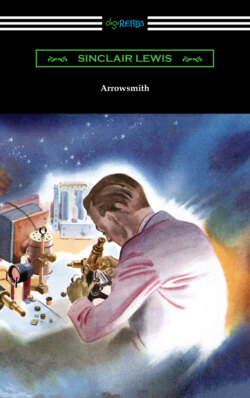Читать книгу Arrowsmith - Sinclair Lewis - Страница 43
На сайте Литреса книга снята с продажи.
Chapter VIII
ОглавлениеI
And always Martin’s work went on—assisting Max Gottlieb, instructing bacteriological students, attending lectures and hospital demonstrations—sixteen merciless hours to the day. He stole occasional evenings for original research or for peering into the stirring worlds of French and German bacteriological publications; he went proudly now and then to Gottlieb’s cottage where, against rain-smeared brown wallpaper, were Blake drawings and a signed portrait of Koch. But the rest was nerve-gnawing.
Neurology, O.B., internal medicine, physical diagnosis; always a few pages more than he could drudge through before he fell asleep at his rickety study-table.
Memorizing of gynecology, of ophthalmology, till his mind was burnt raw.
Droning afternoons of hospital demonstrations, among stumbling students barked at by tired clinical professors.
The competitive exactions of surgery on dogs, in which Angus Duer lorded it with impatient perfection.
Martin admired the professor of internal medicine, T. J. H. Silva, known as “Dad” Silva, who was also dean of the medical faculty. He was a round little man with a little crescent of mustache. Silva’s god was Sir William Osler, his religion was the art of sympathetic healing, and his patriotism was accurate physical diagnosis. He was a Doc Vickerson of Elk Mills, grown wiser and soberer and more sure. But Martin’s reverence for Dean Silva was counterbalanced by his detestation for Dr. Roscoe Geake, professor of otolaryngology.
Roscoe Geake was a peddler. He would have done well with oil stock. As an otolaryngologist he believed that tonsils had been placed in the human organism for the purpose of providing specialists with closed motors. A physician who left the tonsils in any patient was, he felt, foully and ignorantly overlooking his future health and comfort—the physician’s future health and comfort. His earnest feeling regarding the nasal septum was that it never hurt any patient to have part of it removed, and if the most hopeful examination could find nothing the matter with the patient’s nose and throat except that he was smoking too much, still, in any case, the enforced rest after an operation was good for him. Geake denounced this cant about Letting Nature Alone. Why, the average well-to-do man appreciated attention! He really didn’t think much of his specialists unless he was operated on now and then—just a little and not very painfully. Geake had one classic annual address in which, winging far above otolaryngology, he evaluated all medicine, and explained to grateful healers like Irving Watters the method of getting suitable fees:
“Knowledge is the greatest thing in the medical world but it’s no good whatever unless you can sell it, and to do this you must first impress your personality on the people who have the dollars. Whether a patient is a new or an old friend, you must always use salesmanship on him. Explain to him, also to his stricken and anxious family, the hard work and thought you are giving to his case, and so make him feel that the good you have done him, or intend to do him, is even greater than the fee you plan to charge. Then, when he gets your bill, he will not misunderstand or kick.”
